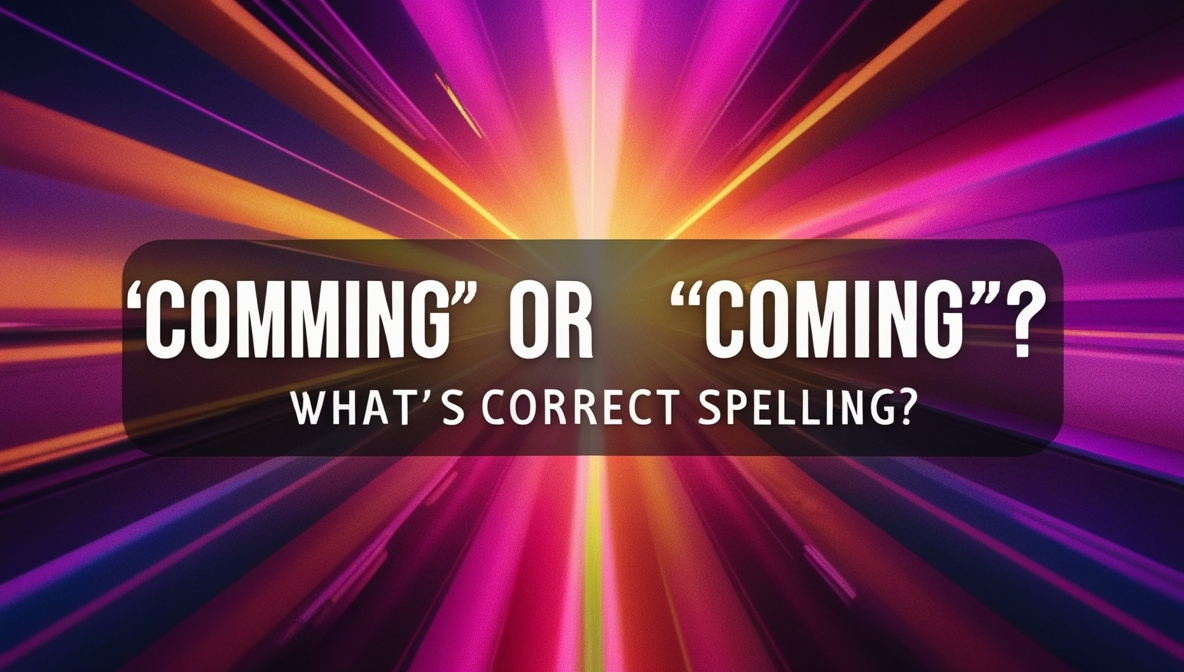The English language is filled with words that can trip us up, especially when it comes to spelling. One common source of confusion is between the words “comming” and “coming.” While they may sound similar, only one of them is correct. In this article, we’ll dive into the details of these two terms, providing clarity through examples and scenarios that highlight their usage.
Understanding the Correct Spelling
The Correct Form: “Coming”
The word “coming” is the present participle of the verb “come.” It refers to the action of moving toward something or someone. This word is widely used in various contexts, making it an essential part of everyday conversation.
Examples of “Coming” in Sentences
- “I am coming to the party tonight.”
Here, the speaker is indicating their intention to attend a social gathering. - “Is spring coming soon?”
In this example, the speaker is inquiring about the arrival of the spring season.
The Incorrect Form: “Comming”
On the other hand, “comming” is a common misspelling of the word “coming.” It lacks any legitimate meaning in English, which can lead to confusion. It’s crucial to remember that if you’re unsure about a word’s spelling, a quick reference can save you from errors.
Why “Comming” is Incorrect
The confusion often arises because of the pronunciation of the word. People might mistakenly think that adding an extra “m” enhances the sound, but in reality, it’s a simple phonetic misinterpretation. Spelling errors like this can occur frequently, especially in informal writing where typos are more likely to be overlooked.
Scenarios Highlighting the Difference
Scenario 1: Planning a Trip
Imagine you’re planning a trip with friends. You send a group message saying:
“I am coming to pick you up at 5 PM.”
Your friends understand that you intend to arrive at their location. If you were to write:
“I am comming to pick you up at 5 PM.”
Your friends might initially be puzzled, as they do not recognize the term “comming.” This small error can lead to misunderstandings, illustrating the importance of correct spelling.
Scenario 2: Discussing Future Events
Consider a conversation about an upcoming event:
“I can’t wait for the concert coming next week!”
This sentence clearly expresses excitement about an event that is soon to happen. However, if you were to mistakenly write:
“I can’t wait for the concert comming next week!”
The meaning remains somewhat intact, but the spelling error can detract from your credibility and clarity in communication.
Scenario 3: Invitations
When sending out invitations for a gathering, clarity is key. You might write:
“Everyone is coming to my birthday party this Saturday.”
This sentence effectively conveys the invitation. If you were to say:
“Everyone is comming to my birthday party this Saturday.”
The confusion around the spelling can cause recipients to question your attention to detail, leading to potential miscommunication.
The Importance of Spelling in Communication
Professional Settings
In professional environments, correct spelling is crucial. A simple mistake can affect your credibility. For instance, if you’re emailing a client and you write:
“Thank you for comming to our meeting.”
This misspelling could undermine your professionalism. Conversely, writing:
“Thank you for coming to our meeting.”
demonstrates attention to detail and respect for the recipient.
Academic Writing
In academic contexts, spelling errors can severely impact your grades. Professors often expect students to have a strong command of language. A sentence like:
“The results are comming in next week.”
might lead to deductions for spelling mistakes. However, if you write:
“The results are coming in next week.”
you present a polished and professional piece of writing.
How to Avoid Common Spelling Mistakes
Practice and Awareness
One of the best ways to avoid confusing words like “comming” and “coming” is through practice and awareness. Reading extensively can help reinforce correct spelling. Whenever you encounter a word you’re unsure about, take a moment to look it up.
Use Technology
In today’s digital age, tools like spell checkers can be invaluable. However, don’t rely solely on them. They may not catch every mistake, especially with homophones or words that sound similar but are spelled differently.
Create Mnemonics
Creating a mnemonic can help you remember correct spellings. For instance, think of “coming” as “come-ing,” which emphasizes the root word “come.” This can serve as a mental trigger when you’re unsure.
Conclusion
In summary, the correct spelling is “coming,” while “comming” is an error that lacks meaning. Understanding the differences between these two can improve your communication skills significantly. By being aware of common pitfalls and actively working to avoid them, you enhance not only your writing but also your overall language proficiency.
Remember, effective communication is not just about what you say but also how you say it. By ensuring that you use correct spelling, you can convey your messages clearly and confidently. Whether in casual conversations or formal settings, being mindful of your language will always serve you well.

